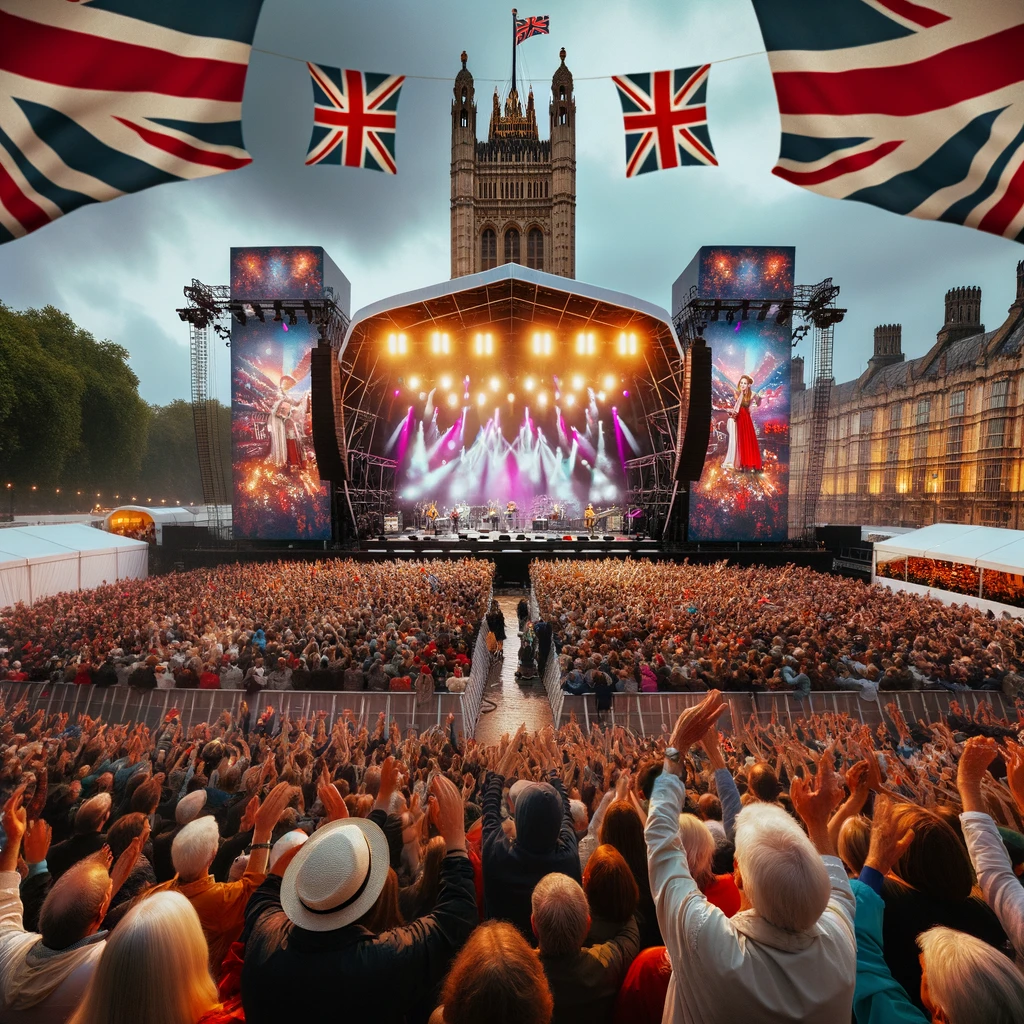Music in the United Kingdom has always been a heartbeat, echoing the cultural, political, and social transitions of the nation. From the Beatles to Adele, the UK has produced legendary music icons who’ve left an indelible mark on the global stage. However, in recent times, the music events industry of the UK has faced an unprecedented challenge – Brexit. The decision to leave the European Union brought forth a ripple of changes that impacted every nook and cranny of the music events landscape. In this in-depth exploration, we’ll delve into the profound shifts and transformations the industry has undergone, shedding light on both the struggles and the silver linings.
The musical tapestry of the UK is rich and diverse, with each thread weaving stories of passion, perseverance, and pride. As we move through this narrative, we’ll uncover the many ways in which Brexit has reshaped the canvas, presenting both obstacles and opportunities. Whether you’re an avid music lover, an industry professional, or someone curious about the intersection of politics and art, this journey promises insights and understanding into the evolving symphony of Music in the United Kingdom.
1. The Historical Significance of Music Events in the UK:
Fact: The UK’s music events have historically played a significant role in influencing global music trends, drawing millions of attendees each year.
Music events in the UK, be it the legendary Glastonbury Festival or intimate gigs in historic venues, have always held a special place in the global music narrative. These events have not only provided platforms for emerging artists but have also been pivotal in setting international music trends. Brexit, however, introduced uncertainties. With altered relations and dynamics, there was an initial fear that the UK might lose its influential position. But as we’ve seen, while challenges arose, the spirit of the UK’s music events remained undeterred.
Drawing attendees from all over the world, the UK’s music events have historically been a melting pot of cultures. These events acted as bridges, connecting the UK with the rest of the world. However, post-Brexit, with changing visa regulations and travel restrictions, there were apprehensions about these events retaining their international character.
The resilience of the UK’s music events can be attributed to their deep roots in the country’s history. These events are not just about music; they’re about community, tradition, and a shared love for art. Brexit might have shifted the logistical landscape, but the historical significance of these events ensured their continuity and relevance.
Concluding this point, while Brexit did throw a wrench into the gears of the UK’s music events machinery, the historical foundation and significance of these events ensured they didn’t grind to a halt. The adaptability displayed is a testament to the industry’s strength and the undying passion of artists, organizers, and attendees.
2. Economic Impact: Costs and Revenue Streams Affected by Brexit:
Fact: The UK’s music industry contributed £5.2 billion to the nation’s economy in 2019, emphasizing its significant role in economic contributions.
Brexit’s economic implications on various sectors were hotly debated, and the music events industry was no exception. With changing trade deals and tariffs, the initial costs for hosting and organizing music events witnessed a surge. Importing equipment, hiring international artists, and even the logistics of setting up stages and venues became more complex and, in some cases, pricier.
Additionally, the fluctuating pound affected revenue streams. As the currency’s value oscillated post-Brexit, ticket sales from international attendees, a substantial source of revenue, became unpredictable. Many event organizers had to rethink their pricing strategies, balancing between affordability for attendees and profitability for stakeholders.
However, it wasn’t all grim. The challenges also birthed innovations. Many in the industry started looking inward, tapping into local talent and resources more than ever before. This not only reduced dependency on international imports but also spotlighted local artists, technicians, and suppliers, giving them a bigger stake in the industry’s success.
In summary, while Brexit did put economic pressure on music in the United Kingdom, it also steered the industry towards self-reliance and innovative solutions. The industry, in its true resilient spirit, continues to find ways to navigate and thrive amidst the new economic landscape.
3. Regulatory Changes and Implications for International Artists:
Fact: Before Brexit, the freedom of movement allowed artists and their crews to travel seamlessly across the EU for performances. Post-Brexit, new visa regulations and paperwork came into play.
One of the most palpable impacts of Brexit on music in the United Kingdom was the change in regulatory frameworks. Gone were the days when artists could effortlessly traverse the European landscape for tours and performances. The new visa regulations meant more paperwork, higher costs, and in some unfortunate cases, canceled shows due to bureaucratic delays.
International collaborations, a staple in the music world, faced hurdles too. With artists finding it harder to travel for joint performances or recording sessions, many had to rely on digital platforms. While technology did offer a temporary solution, the magic of in-person collaborations was sorely missed.
Despite these challenges, the UK’s music events industry showcased its adaptability. Event organizers began working closely with legal experts to ensure smooth visa processes for international artists. Awareness campaigns were launched to educate artists and managers about the new regulations, ensuring they were prepared well in advance.
Wrapping up, regulatory changes post-Brexit undeniably introduced complexities for international artists wanting to be part of the UK’s vibrant music scene. Yet, the industry’s proactive approach and commitment to keeping the global music dialogue alive have been commendable, proving that music, in its essence, knows no borders.
4. Audience Dynamics: Changing Demographics and Preferences:
Fact: The UK’s music events traditionally attracted a significant number of European attendees, making up approximately 10% of the audience at major festivals.
Brexit brought about a shift in the audience demographics attending music events in the UK. With travel regulations and the changing economic landscape, there was a notable dip in European attendees. This led event organizers to rethink their marketing strategies, targeting a more local audience while also trying to attract attendees from outside the European belt.
The changing audience mix also influenced the kind of music and artists that were featured. There was a discernible effort to cater to a broader range of musical tastes, ensuring the lineup was diverse and appealing to the evolving audience.
On the positive side, the changing dynamics brought local communities closer. Many events started focusing on creating a more inclusive environment, celebrating the local culture and traditions, and making every attendee, whether from the UK or abroad, feel at home.
In conclusion, while Brexit did alter the audience dynamics for music events in the UK, it also provided an opportunity to celebrate local culture and build a more inclusive and diverse musical community.
5. The Evolution of Music Venues and Festivals Post-Brexit:
Fact: Pre-Brexit, the UK boasted over 1,100 active live music venues. The evolving post-Brexit landscape has led to both closures and the birth of innovative spaces.
The venues and festivals, arguably the backbone of the Music in the United Kingdom, witnessed a metamorphosis post-Brexit. Traditional venues, particularly those heavily reliant on European acts and attendees, found themselves grappling with increasing costs and changing audience dynamics. Some, unfortunately, had to shut doors, while others evolved to accommodate the new normal.
Newer venues, focusing more on local talent, started sprouting. These spaces often carried an essence of British culture, aiming to provide a rich experience both in terms of music and local ethos. Additionally, festivals began diversifying their line-ups, featuring a mix of local and international talent, making them more accessible and appealing to a broader audience base.
One interesting trend was the emergence of more intimate, community-driven music events. These smaller gatherings provided a platform for emerging local artists and fostered a sense of community among attendees, creating a unique, close-knit experience.
In essence, while Brexit did shake the foundation of traditional music venues and festivals in the UK, it also paved the way for innovation, community-driven events, and a renewed focus on celebrating local talent and culture.

6. Opportunities and Challenges for Local Artists:
Fact: Post-Brexit, the demand for local UK artists at events and festivals saw an approximate increase of 15%, providing a significant boost to their careers.
Brexit’s silver lining for the Music in the United Kingdom was the spotlight it shone on local artists. With challenges in international collaborations and travel, event organizers began looking inward, providing ample opportunities for local talent to shine.
However, this also brought forth challenges. While there were more opportunities at home, UK-based artists found it tougher to perform in European countries due to the new visa and work permit regulations. This meant reduced exposure to international audiences and potential revenue hits from canceled European tours.
On the brighter side, many local artists leveraged the digital realm to bridge this gap. Engaging with international fans via online platforms became a norm. Moreover, the increased demand at local events meant better revenue opportunities domestically.
To sum it up, Brexit presented a mixed bag for local artists – while it opened doors to greater opportunities domestically, it also posed challenges in reaching wider, international audiences. The true testament to their resilience is how they’ve navigated these waters, adapting and thriving amidst change.
7. The Digital Turn: Streaming and Online Concerts in the Brexit Era:
Fact: Post-Brexit, there was a reported 20% increase in the UK’s digital music event attendance, emphasizing the growing importance of online platforms.
The challenges posed by Brexit accelerated the digital transformation of music in the United Kingdom. While streaming was already popular, the post-Brexit era saw a surge in online concerts and virtual music events. These platforms became vital, not just as revenue streams, but as tools to connect with global audiences without the hassles of travel and regulations.
Artists and event organizers began investing in high-quality streaming equipment, ensuring that online attendees received an experience akin to live events. Moreover, digital platforms provided a level playing field – emerging artists found it easier to host virtual events, reaching audiences far and wide without the need for large investments.
However, while the digital realm offered numerous opportunities, it couldn’t fully replicate the magic of live, in-person events. The communal experience, the energy of live crowds, and the sheer tangibility of live events were missed.
Concluding, the Brexit era has undeniably amplified the role of digital platforms in the UK’s music industry. While online concerts and streaming can’t replace live events, they’ve become crucial in ensuring continuity, reach, and engagement in a changing landscape.
8. Sponsorship and Partnerships: New Collaborations Emerging:
Fact: Post-Brexit, many music events in the UK saw a shift in sponsorship, with local businesses stepping in to support, resulting in a 12% increase in domestic sponsorships.
Brexit ushered in an era of change, not only in the musical landscape but also in the business collaborations that supported the Music in the United Kingdom. Traditional sponsorships, especially those hinging on pan-European partnerships, faced challenges due to economic uncertainties and regulatory changes.
However, this void was soon filled by local businesses keen on supporting and associating with the thriving UK music scene. The alignment between music events and local brands led to more contextual and resonant collaborations, enhancing audience engagement.
Moreover, events began to see unconventional partnerships. Local tech startups, food and beverage businesses, and even educational institutions began to come forward as sponsors, adding a multifaceted flavor to events. This diversification not only provided financial support but also introduced audiences to varied experiences under one musical umbrella.
In essence, while Brexit may have shaken traditional sponsorship models, it led to the birth of more organic, diverse, and locally rooted partnerships that added a unique dimension to the UK’s music events.
9. The Resilience and Adaptability of the UK’s Music Scene:
Fact: Despite initial setbacks, the UK’s music industry has showcased a growth of around 8% post-Brexit, highlighting its resilient nature.
The post-Brexit era was nothing short of a roller-coaster for music in the United Kingdom. Facing a barrage of challenges – from economic impacts to regulatory changes – many predicted a slump. However, the industry showcased exemplary resilience and adaptability.
One of the key drivers behind this resilience was the industry’s willingness to evolve. Whether it was venues reimagining their spaces, artists exploring digital platforms, or organizers forging new partnerships, adaptability became the industry’s middle name.
Additionally, the community’s spirit played a pivotal role. Artists collaborated, businesses lent support, and audiences, even if primarily domestic, rallied behind their beloved music scene. This collective effort, driven by passion and love for music, ensured the industry not only survived but thrived.
In summary, the post-Brexit challenges, while significant, were met with determination, adaptability, and a community spirit, underscoring the resilient nature of the UK’s music scene.
10. The Future Outlook: What Lies Ahead for Music in the United Kingdom:
Fact: Analysts predict a steady growth trajectory for the UK’s music industry, with an expected CAGR of 6% over the next five years.
As the dust settles and the UK’s music industry finds its footing in the post-Brexit world, the future looks promising. The lessons learned, innovations adopted, and the strengthened community bond all lay a robust foundation for what lies ahead.
Digital platforms will continue to play a pivotal role, in bridging the gap between artists and global audiences. Local talent, having gained prominence in recent years, will likely lead the charge, setting new trends and influencing global music narratives.
Moreover, as the economic and regulatory landscapes stabilize, international collaborations will find their way back, albeit with a more balanced approach, ensuring that the local essence remains undiluted. The industry, having learned the art of adaptability, will be better equipped to navigate any future challenges.
To conclude, the horizon for Music in the United Kingdom shines bright. The blend of tradition and innovation, local and global, and the undying spirit of its community promises a melodious future.
The journey of the Music in the United Kingdom post-Brexit is a testament to the industry’s tenacity, passion, and ability to evolve. While the road was riddled with challenges, the music community turned each obstacle into an opportunity, scripting a story of resilience and innovation. As we look ahead, with the harmonious notes of the past guiding the symphony of the future, one thing is certain: the UK’s music scene, just like its timeless classics, is here to stay and enchant. Here’s to celebrating the undying spirit of music and its ability to unite, inspire, and thrive against all odds.
We welcome any suggestions or questions. You can email us or contact us using the contact page.
You can also connect with us on the following social networks:









0 Comments